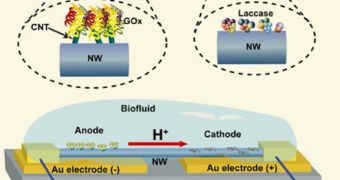An international collaboration of experts has recently developed a new type of miniature fuel cell that is capable of using biological fluids to generate electricity. The work could become very important in the near future, as experts create more advanced medical biosensors.
The science team that produced the fuel cells, featuring experts from China and the United States, says that even blood can be used to create energy via this innovative device.
One of the most interesting applications that could become possible with this miniature fuel cells is a device implanted in living tissue, that could generate its own power.
These include pacemakers and medical biosensors, which are currently considered to be a very promising diagnostics tool. Other applications in small-scale devices may also become possible.
According to the Chinese experts, the basis of the new fuel cell is a nanowire made out of a polymer composite, which connects and couples two redox enzymes. The nanowires can conduct single protons only.
The cells itself was constructed at the Tsinghua University in Beijing, by a team led by expert Jing Zhu, Chemistry World reports.
The group explains that the nanoscale wire is made up out of carbon nanotubes, and that it is between 200 and 800 nanometers (billionths of a meter) in diameter.
On one of its ends the researchers attached glucose oxidase molecules, while the other has laccase molecules on it. Both ends are inserted in gold electrodes to begin with.
“The nanowire-based fuel cell generates an output power as high as 0.5-3microwatts, and it has been integrated with a set of nanowire based sensors for performing self-powered sensing,” Zhu explains.
“It shows the feasibility of building self-powered nanodevices for biological sciences, environmental monitoring, defense technology and even personal electronics,” the expert adds.
“'This is an interesting initial study of a new approach to energy harvesting in the human body and the power generated appears to be suitable for nanodevices,” explains the chairman of the IDTechEx company, Peter Harrop.
“Whether it becomes a commercial prospect depends on adequate life, reliability and cost being demonstrated in further work,” adds the official, whose company carries out groundbreaking research and analysis of energy harvesting technologies.

 14 DAY TRIAL //
14 DAY TRIAL //